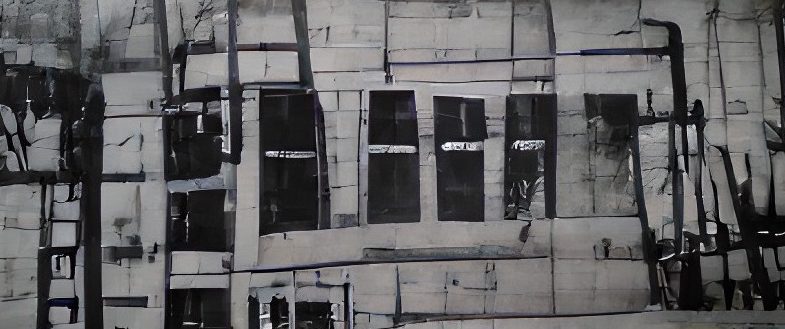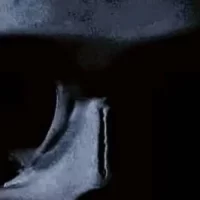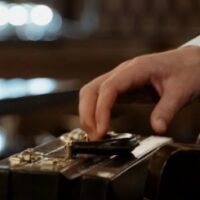Ballistic at how quickly one murder had turned into two I shot out into the night, spiraling directionless, trying to think of what to do next. I slammed my fist into the steering wheel, trying to clear my brain, crowded with anger at Sophie’s impetuousness, the Russian’s stupidity, and my own clouded judgement. I stomped on the pedals with swollen feet and I wondered if heading back to the tenement would only get Sophie killed as well. After driving for a few lightless eternities to calm down a bit, Cheryl’s voice could be heard over my own beating blood enough that it pointed out a simple truth: If I never headed back to the apartment and Sophie found me murdered, she wouldn’t stop until she was dead herself.
That was some consolation. Enough that it gave me headspace to come up with something that resembled a plan.
I thought a lot about Mitnick and Sartre, and I remembered a name that Atwell had mentioned. I reversed course, heading south, until I found another lone payphone. Next to a converted barn that now served as a tram station, the phone’s bubble covering and square face made it look like an alien thing that had plummeted to Earth. I knew how it felt.
I parked a ways from it, left the motor running and hopped out, running fast enough that I nearly collided with it. I yanked the receiver off the cradle and dialed 112.
Barely audible through the static of the old copper transmission lines I heard a voice say something in a calm, professional, and slightly bored French. I disregarded the question I didn’t understand and said in French, “I need to speak to Inspector Rotella.”
Between the garbled voice and my grasp of the local dialect I didn’t understand much of what came back from the operator, but I’m sure it was the equivalent of, “Sir, this line is for emergencies only.”
I struggled with how to respond in French, but fortunately had practiced what I was going to say while driving around searching for one of France’s three working payphones. I told the operator, “Tell Inspector Rotella there’s a fire at a gas station in L’Ariane. It’s not far from Cemetery Hill.”
Afraid that my dog French would give me away, I slammed the receiver down before the operator confirmed what I said. I ran back to the car, the chaos I was causing to cover my tracks rippling out from the payphone with its last transmission.
Despite the exhaustion that adrenaline was wrecking on me, it was still pretty early in the evening by European nightlife standards. I drove south and west, skirting the mountains and staying out of the city proper, till I came to the river. I turned full south then, driving through tunnels that cut through the dark belly of the mountains, until they began a gradual descent that narrowed the closer it got to the sea. The hills were eventually replaced by the city’s edge, a fringe of rotating decrepit industrial sectors and their gentrified counterparts, converted old factories and warehouses that had become duty-free shops and high-priced lofts, both the size of American-style malls.
In between a couple of the warehouses that were still stained with the ghosts of past work, I pointed the car east, into the city, the smooth concrete of the riverside becoming rounded cobblestones as I drove into history. In between the bookends of old mills and workshops, I hunted for a place to park. I accelerated the car between lights, afraid of being spotted even as the irregular pace I set probably drew attention of whoever might have seen me. Eventually, I abandoned the Lexus at some dark, unnamed spot, wiping it down for fingerprints in the shadow of what smelled like a vacant paper mill.
I trudged down the alley that would take me to the Factory, the collar of my peacoat turned up against the evening drizzle in the hopes that both might keep anyone from seeing my face. At the door I paid the full admission without question, hoping the bouncer, this one with a full head of hair, might not remember me.
It was only by the time I was inside that I realized I hadn’t been feeling the earthshaking bass that I had before. I must have arrived between sets. The cavern of The Factory, much to my disappointment, was dark and empty, no stage lights, dancing, or music to distract from me. I scurried like a beetle across the cement floor, waiting for a boot to crush me. My eyes kept darting to the stage, its cyclopean speakers the only thing that might hide someone besides the square pillars that dotted the floor.
In comparison, dodging through the gate of the Abattoir felt comforting. Whatever relief this provided, though, was quickly dissolved by a fast circuit between the red booths that provided no sign of the Idiots. In case they were hiding under tables, I made the rounds again. When that, unsurprisingly, didn’t produce different results I bought a ridiculously over-priced bottle of water off of a crimson-haired waitress and then sat down in a booth where I could see both the entrance from the dance floor and the fire exit. I sat and waited, my mind reminding me that Max had told me the Idiots were at The Factory “most nights” and this might not be one of them.
To read the next chapter, go here.
To read the previous chapter, go here.
See author’s published work here.
Related Posts
The American: Chapter 77 Next Post:
The Case of the Cloud Gazer

























